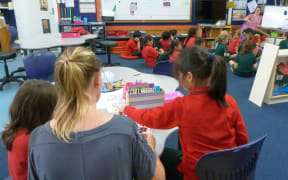ANALYSIS: The government's overhaul of the school and early childhood funding systems is still under development, but this week a few clues emerged as to where things are heading.

The government seems likely to remove the decile system and the need for schools to manage their own property. Photo: 123rf
The clues came with the announcement of an 18-member advisory group that would consider the Education Ministry's work so far on the funding systems, and the publication of the group's terms of reference.
The fact that the government has appointed a single advisory group of both early childhood and school sector representatives to advise on both funding systems is interesting in itself.
The government has repeatedly stressed the need for better transitions from early learning to school, especially for children with special education needs.
The terms of reference say funding should focus on children's "learning progress and achievement" and the approach "should be consistent throughout the education journey".
So could there be a single funding system for the two sectors? The Education Minister's office has not denied that as a possibility, but it is hard to see how it would work given vast differences in the sectors' relationships with government and their enrolment, employment and property ownership structures.
However, a special education system that works across both sectors - without the divisions that often see little to no continuity of care as children move from early learning to school - is a certainty.
Deciles demolished
Another certainty is that the decile funding system for schools is toast.
For years, Education Minister Hekia Parata has said principals and teachers do not like it - and nor does she.
The main criticisms are that the decile is misunderstood by parents who think a school's decile number indicates its quality, and that it is a blunt instrument.
For example, two schools with the same decile will have the same proportion of children from the most disadvantaged neighourhoods, and therefore the same amount of decile-linked funding, but the remainder of their student population could be wildly different.
The terms of reference give some indication of what might replace the deciles. They say the funding systems should "better support children at risk of educational under-achievement, drawing on the social investment work".
That work has identified four main risk factors for children.
Educational underachievement risks
- Family's long-term reliance on benefits
- Child's mother has no qualifications
- A parent has been to prison
- Child or a sibling has been abused
It seems likely that extra funding will be targeted to schools and early childhood centres that enrol those children.
Performance-based funding?
The terms of reference say the review will shift the funding system so it is focused on children's learning progress and achievement.
That could be read to mean performance funding, where schools get more money if their students' results are good.
If that's the case, teacher unions and principals' groups will not be happy.
They will argue that their members are being held accountable for children who are failing because of socio-economic factors that are beyond their control.
Funding by challenge not enrolments
Just how much of a revolution the government is cooking up remains to be seen, but there are indications the funding review will be more than just tinkering round the edges.
The review is going to "direct funding to the size of the education challenge ECE services, schools and Communities of Learning face rather than the size of their rolls and the cost of their inputs".
And it says a problem with the current system is that "resourcing levels may not be well matched to the teaching and learning challenge and care and pastoral needs at each stage of learning".
Both statements indicate a fundamental realignment of both funding levels and the basis of allocation could be on the cards.
School property
The review aims to free up principals to focus on teaching by "clarifying property related responsibilities and accountabilities, and to better protect the Crown's investment in school infrastructure".
A change in this area has been on the cards for several years because some schools have not done a good job of taking care of their buildings.
The ministry has trialled regional contracts for school maintenance and it is possible schools will lose direct responsibility for maintaining their buildings or be given more options for handing it off to a third party.
Rural and private schools in the mix
The review will "reassess the base funding provided to support the educational viability of remote small schools".
That's good news for rural areas, assuming of course the reassessment results in more funding not less.
The review will also "ensure diversity of choice for parents/whānau and consistency and certainty of funding for different types of schools".
Education experts say New Zealand's schools already provide a high degree of choice and it is not clear if the intention here is to maintain the status quo or make a change.
However, private schools have long argued for more certainty about their government funding.
They share a capped pool of money, so the amount they get per student varies from year to year depending on how many children are enrolled across the entire private sector.







